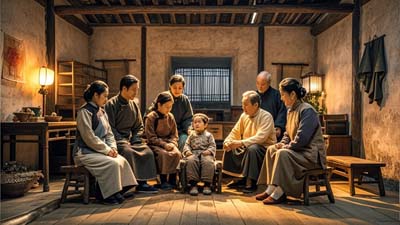
压岁钱的故事 (Yāsuìqián de gùshi) The Story of Pocket Money for Children on Lunar New Year’s Day
哭 (kū):
to cry
宝贝 (bǎobèi):
baby/ take sth/ sb as treasured one
告诉 (gàosù):
to tell
Gǔ shíhou, yǒu yígè xiǎoyāo jiào “Suì.”
古 时候, 有 一个 小妖 叫 “祟”。
In ancient times, there was a demon called “evil spirit.”
Tā xǐhuan zài chúxī wǎnshang yòng shǒu mō háizi de tóu.
他 喜欢 在 除夕 晚上 用 手 摸 孩子 的 头。
He loved to touch the heads of children on Chinese New Year’s Eve.
Bèi tā mō guò de háizi jiù huì dàkū, tóuténg fārè, zuìhòu biànchéng le shǎzi.
被 他 摸 过 的 孩子 就 会 大哭, 头疼 发热,最后 变成 了 傻子。
Children touched by him were scared to tears; then they developed a headache, followed by a fever, and eventually turned into a fool.
Suǒyǐ, měi nián chúxī, měi yìjiā dōu liàng zhe dēng bú shuìjiào, zhè jiàozuò
所以,每 年 除夕, 每 一家 都 亮 着 灯 不 睡觉, 这 叫做
“shǒu Suì.”
“守 祟”。
Therefore, every family had lights on throughout the night, and this was called: “protection from the evil spirit.”
Yǒu yìjiā fūqī hěn bǎobèi tāmen de xiǎo’érzi.
有 一家 夫妻 很 宝贝 他们 的 小儿子。
There was a couple who viewed their young son as their treasured one.
Chúxī yèwǎn, tāmen bùjīngyì de jiāng bā méi tóngqián yòng hóng zhǐ bāo
除夕 夜晚, 他们 不经意 地 将 八 枚 铜钱 用 红 纸 包
qǐlái, fàngzài shúshuì de háizi de zhěntou xiàmian.
起来,放在 熟睡 的 孩子 的 枕头 下面。
They put eight coins in a red wrap and placed it below the child’s pillow casually on New Year’s Eve.
Bànyè “Suì” gāng yào qù mō háizi de tóu, zhěntou biān jiù fāchū shǎnguāng,
半夜 “祟” 刚 要 去 摸 孩子 的 头, 枕头 边 就 发出 闪光,
xiàde “suì” táopǎo le.
吓得 “祟” 逃跑 了。
When the “evil sprit” was about to touch the child’s head, the eight coins below the boy’s pillow sent out a bright light which scared the “evil spirit” away.
Yuánlái bā méi tóngqián shì bāxiān biànde, ànzhōng lái bǎohù háizi de.
原来 八 枚 铜钱 是 八仙 变的, 暗中 来 保护 孩子 的。
In fact, in the story the eight coins were reprsent the eight immortals who had secretly assumed the shape of coins to protect the children.
Yīnwèi “Suì” yǔ “suì” tóngyīn, zhīhòu zhújiàn yǎnbiàn wéi “yāsuìqián.”
因为 “祟” 与 “岁” 同音, 之后 逐渐 演变 为 “压岁钱”。
Because the “evil spirit” and “year” share the same pronunciation in Mandarin Chinese, it gradually began to be called “Pocket money for children on lunar New Year’s Day.” instead.
The character “哭 (kū)” means to cry.
Zài guò chūnjié de shíhou, xiǎoháizi búyào kū, yào xiào.
在 过 春节 的 时候, 小孩子 不要 哭,要 笑。
Children are encouraged to laugh instead of crying during the Chinese New Year.
The character “宝 (bǎo)” means precious and “贝 (bèi)” means shell.
Bǎobèi, māma míngtiān dài nǐ qù gōngyuán wán.
宝贝, 妈妈 明天 带 你 去 公园 玩。
Baby, mom would like to take you to the park tomorrow.
Tā hěn bǎobèi tā nà bǎ jiùjítā.
他 很 宝贝 他 那 把 旧吉他。
He takes his old guitar as his treasured one.
Both the character “告 (gào)” and “诉 (sù)” mean to tell.
Tā gàosù wǒ míngtiān kěnéng huì xiàyǔ.
他 告诉 我 明天 可能 会 下雨。
He told me that it might rain tomorrow.
生词 (shēngcí) Vocabulary
孩子(háizi):
child
枕头(zhěntou):
pillow
保护(bǎohù): v. to protect
Related Post:
What is in That “红包(hóngbāo) Red Envelope
Chinese Culture
General Chinese (Beginner Level)
General Chinese (Intermediate Level)




Articles and content in this section of the website are really amazing.
I’ve found myself here quite a few times before while looking various things. I appreciate the detailed articles you write, and in some instances this is the ONLY place I can even find them. Cheers
Thanks
You are welcome. Hope the posts can help you learn Chinese well.